Egypt 'let down' by continued UK flight ban to Sharm
- Published
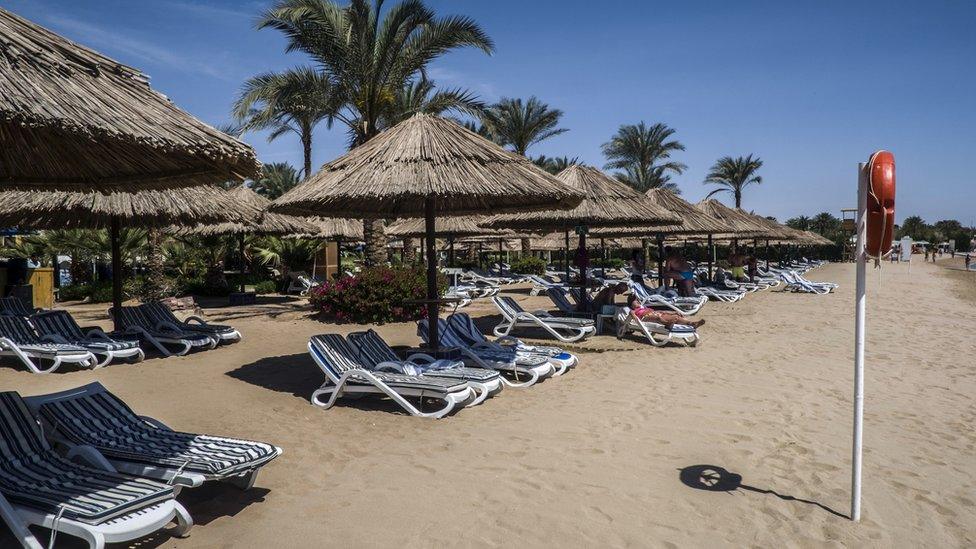
Egypt feels badly let down by its ally and partner Britain, according to officials who spoke to the BBC on condition of anonymity.
The Egyptian government believes it has complied with every security improvement demanded in the wake of the 2015 bombing of a Russian passenger plane by so-called Islamic State (IS) that killed everyone onboard soon after take-off from Egypt's Sharm el-Sheikh airport in the Sinai Peninsula.
Yet 18 months on from the incident, as other European tourists have returned to the Red Sea resort in their thousands, the UK has refused to reverse its suspension of flights to Sharm el-Sheikh, allegedly on direct orders from No 10.
Downing Street has declined to comment but the Department for Transport said: "The security of British nationals is our top priority, and we took the decision to suspend flights from Sharm el-Sheikh in November 2015 following the Metrojet crash to protect the travelling public.
"We continue to work closely with the Egyptian authorities on security arrangements at the airport. We keep aviation security under constant review and will resume flights as soon as we can."
The problem is that despite an exhaustive, months-long investigation, Egypt has not so far been able to find and arrest the perpetrators of the bombing.
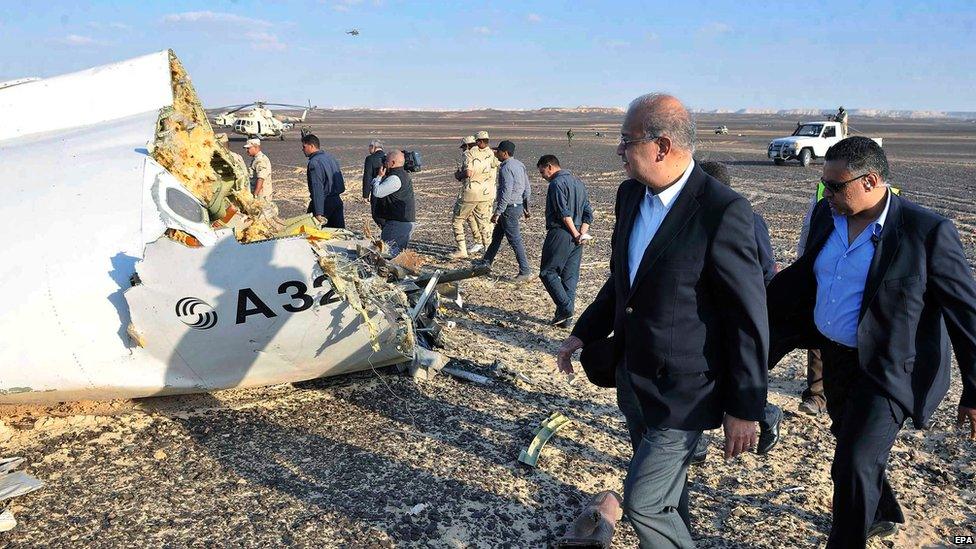
Egyptian Prime Minister Sherif Ismail (foreground) visited the crash site
Shortly after taking off from Sharm el-Sheikh's international airport for St Petersburg on 31 October 2015 Metrojet flight 9268 disintegrated in mid-air over the Sinai desert, killing all 224 passengers and crew.
The Egyptian government initially disputed that terrorism was the cause but western intelligence agencies detected increased "chatter" by jihadists just ahead of the incident, including messages of congratulation sent from inside Syria.
This was shared with the Russian government, prompting both countries to suspend flights to the Sharm resort indefinitely. IS's Sinai affiliate claimed responsibility for the attack.
Egyptian officials now admit that at the time in question, October 2015, Sharm el-Sheikh airport fell well short of international security standards.
But they responded to a damning January 2016 report about its shortcomings by allowing in a team of British aviation security experts who have now spent time assessing all of Egypt's major airports.
Cairo, Marsa Alam, Hurghada, Luxor, Aswan and Sharm el-Sheikh have all now been inspected at length, with a semi-permanent presence of British aviation experts.
Egypt says biometric screening for all airport staff has been introduced at some of these airports, with sensitive explosive detection equipment even having to be imported by the military in order to circumvent lengthy bureaucratic customs delays.
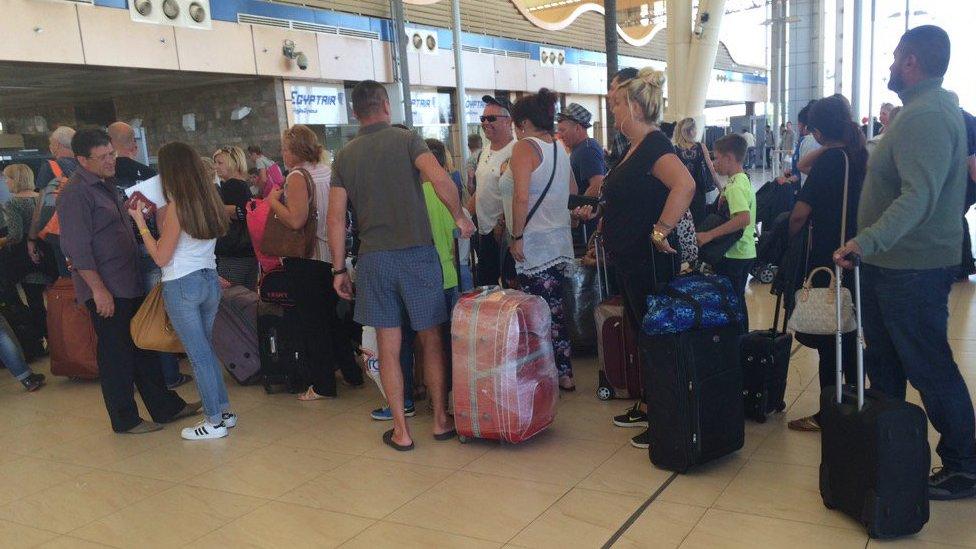
Some 20,000 British nationals were thought to be in the resort at the time of the crash
The FCO says about 231,000 British nationals visited Egypt in 2016 and that most visits were trouble-free. In 2015 some 900,000 Britons travelled to the country.
At Sharm itself, say Egyptian officials, it is not only the ground staff at the airport who have been investigated, but also their families and their families' relatives.
The result, they say, is that, in order to rule out any chance that an airport employee's relative may have extremist sympathies, between 40-50% of employees have lost their security clearance and their jobs at Sharm el-Sheikh airport.
'Rising terrorism threat'
Security there, say officials, is now being run by a private company, separate from the airport authority, after receiving extensive training from British aviation experts.
"We have implemented all the recommendations made for improvements at Sharm and received regular and positive reports back from the UK," said an Egyptian official who asked not to be named, adding: "This means that Sharm el-Sheikh is comparable to the safest airports in the world, and yet it seems to have had no effect on the UK flight ban."
The situation today is incongruous. The UK Foreign Office Travel Advisory, external marks the fenced-off area around Sharm el-Sheikh as "green", meaning that it does not advise against travel there.
Yet given that the rest of the Sinai is marked in orange and red, where the FCO advises against travel, it is considered too dangerous to travel overland.
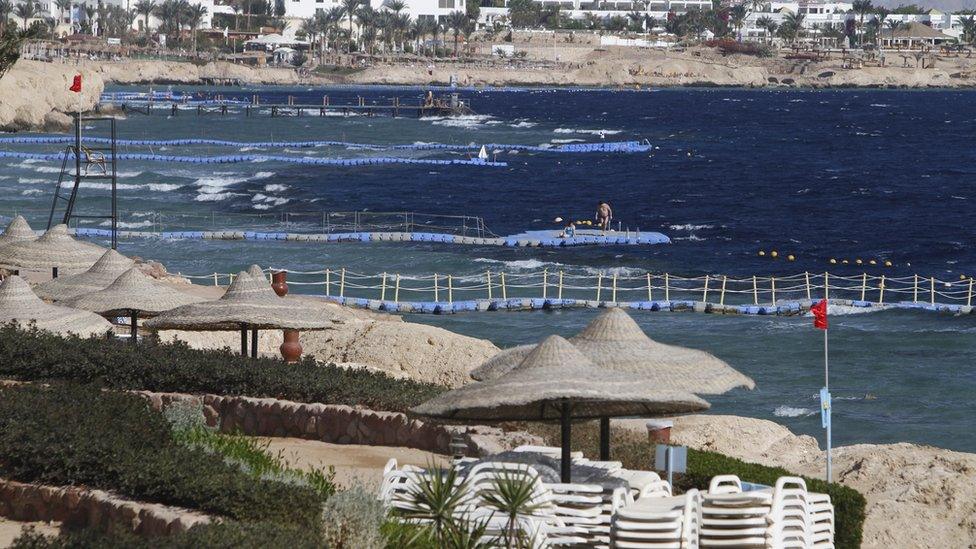
The FCO Travel Advisory says that as a precautionary measure it advises against air travel to Sharm.
Thomson, First Choice, Monarch and all the other UK charter flight operators take their cue from the FCO Advisory. Although this is not strictly a government order to comply, insurance is a major factor and none has chosen to flout the advice.
But a senior Whitehall official told the BBC that with the Egyptian authorities facing an ongoing and rising threat from terrorism and insurgency in the Sinai, "The metrics are going in the wrong direction".
An armed attack by IS near St Catherine's Monastery in the Sinai this month killed a police officer, there have been frequent attacks on police and soldiers in north Sinai, while bombings of Coptic churches on the Egyptian mainland have prompted President Abdul Fatah al-Sisi to declare a three-month state of emergency.
Simmering in the background is a sense of injustice by Cairo towards the way the UK has handled all this.
'Supposed to be partners'
The UK's decision to suspend all flights to Sharm el-Sheikh was announced, unilaterally, on 5 November 2015 just as President Sisi was on his way to London for a pre-arranged visit with a large entourage.
I met him the next morning as he addressed journalists and business leaders and there was a strong sense of pique.
"If the UK had intelligence about this attack, then why did it not share it with us?" Egypt's foreign minister asked me, adding: "We are supposed to be partners."
The two governments also differ sharply in attitudes towards the Muslim Brotherhood, which Egypt sees as a terrorist organisation but which the UK refuses to outlaw.
Both Egyptian and UK tour operators want to see British tourists return to Sharm el-Sheikh but one thing is clear.
No decision will be taken before the 8 June general election in Britain. But after that, there is still no sign of the travel ban being lifted.
An Egyptian official said: "We accepted the idea of a road map to improve security... but a road map has to have a destination and right now we can't see one."
- Published17 November 2015
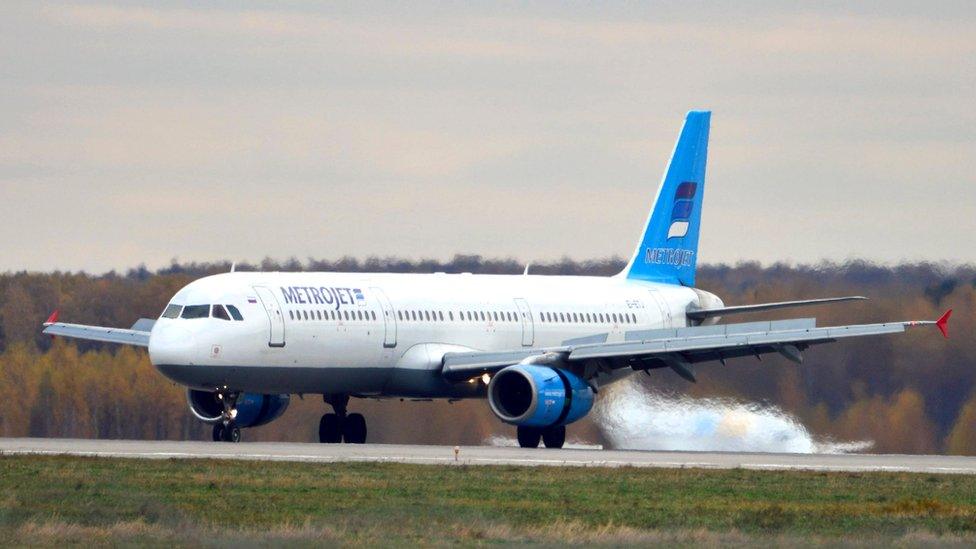
- Published13 November 2015
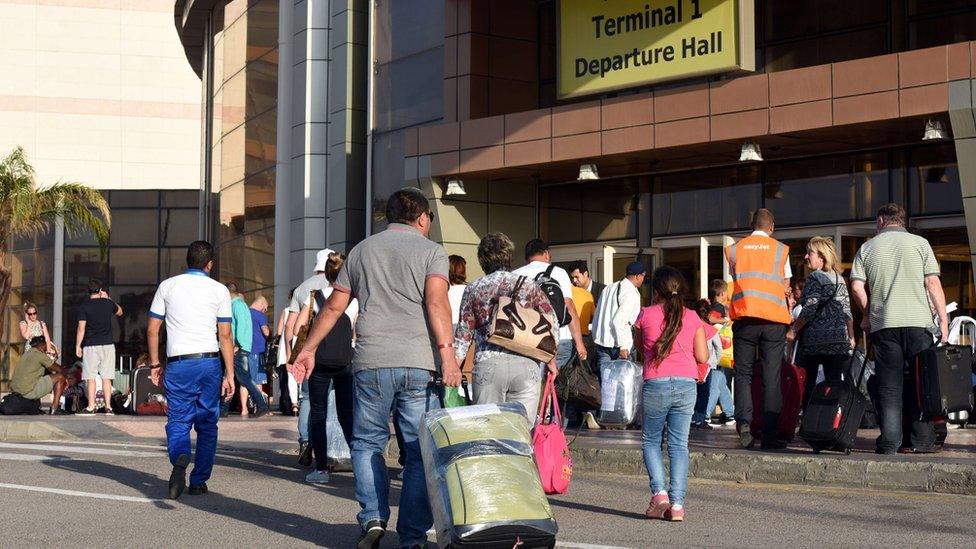
- Published4 November 2016
